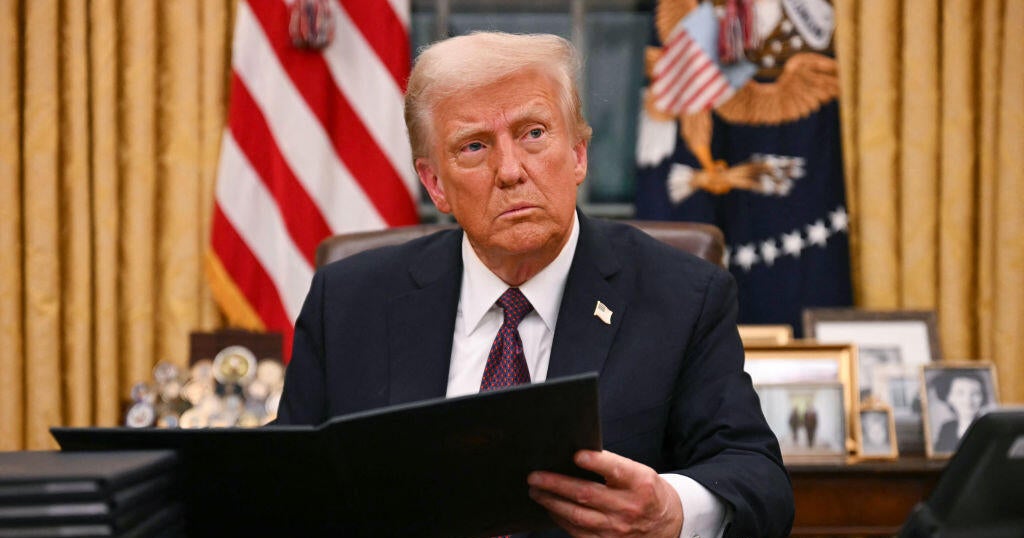
Second judge blocks portions of Trump’s executive order seeking to overhaul U.S. elections
13. June 2025
Washington — A federal judge in Massachusetts blocked President Trump’s administration from implementing portions of his executive order that imposed new requirements involving proof of citizenship to register to vote in U.S. elections.
U.S. District Judge Denise Casper agreed to grant a preliminary injunction sought by attorneys general from 19 states, who brought their legal challenge to Mr. Trump’s executive order in April and sought to block sections of it. She found that the states were likely to succeed in their case.
Casper is the second judge to prevent the Trump administration from implementing provisions of the executive order, which aimed to overhaul U.S. elections. A federal judge in Washington, D.C., agreed in April to issue a preliminary injunction in a trio of cases brought by voting rights groups and the Democratic Party.
“There is no dispute (nor could there be) that U.S. citizenship is required to vote in federal elections and the federal voter registration forms require attestation of citizenship,” Casper wrote. “The issue here is whether the president can require documentary proof of citizenship where the authority for election requirements is in the hands of Congress, its statutes … do not require it, and the statutorily created [Election Assistance Commission] is required to go through a notice and comment period and consult with the states before implementing any changes to the federal forms for voter registration.”
The judge’s decision blocks the Trump administration from implementing five sections of the executive order, including a provision that mandates the Election Assistance Commission, a federal independent regulatory commission, to require documentary proof of citizenship in the standardized national voter registration form and mandates that states record information about the documents presented by voters.
Casper said that the executive order’s instruction for the EAC to add a documentary proof of citizenship requirement to the federal voter registration form “conflicts with the will of Congress, rendering the president’s power ‘at its lowest ebb.'” She noted that because the president does not have a constitutional duty to direct the content of election regulations, the executive order’s mandate to the EAC is “undue interference.”
The judge also stopped the Trump administration from implementing Mr. Trump’s directive for the secretary of defense to update a federal application for absentee voting for members of the military and overseas voters to require documentary proof of citizenship and proof of eligibility to vote in federal elections held in their states.
“Neither the Constitution nor any statute grants the president the authority to enact” that provision, Casper wrote, adding that Mr. Trump’s mandate “appears to be in conflict with the will of Congress, which is duly authorized to act in this area, and has acted through its enactment of the” Uniform Overseas Citizens Absentee Voting Act in 1986.
Other provisions covered by Casper’s injunction require the heads of federal voter registration agencies to assess citizenship before providing a voter registration form to people enrolled in public assistance programs, and order the attorney general to take action against states that count mail-in ballots received after Election Day.
She found that the requirements will pose expensive and time-consuming burdens on the states, and risk chilling voter registration and participation, which Casper wrote is “the antithesis of Congress’s purpose in enacting” federal election laws.
The president issued his election-focused executive order in March after he and his allies raised unfounded claims that the 2020 election was rife with fraud and rigged against him. The head of the Cybersecurity and Infrastructure Security Agency at the time, Christopher Krebs, said after that election that the 2020 vote was “the most secure in American history.” But Mr. Trump has continued to repeat his assertions about fraud in the election in the White House.
“Free, fair, and honest elections unmarred by fraud, errors, or suspicion are fundamental to maintaining our constitutional Republic. The right of American citizens to have their votes properly counted and tabulated, without illegal dilution, is vital to determining the rightful winner of an election,” his executive order states.
Congress has the power to decide how federal elections are run, and it has done so through laws like the National Voter Registration Act and the Help America Vote Act. The Constitution gives state legislatures the authority to set the “times, places and manner” of holding elections.
It is already illegal for non-U.S. citizens to vote in federal or state elections and can lead to fines and up to five years in prison. A noncitizen convicted of voting in a federal election may face deportation or have their legal status revoked. Lying about U.S. citizenship to register to vote can also lead to deportation.